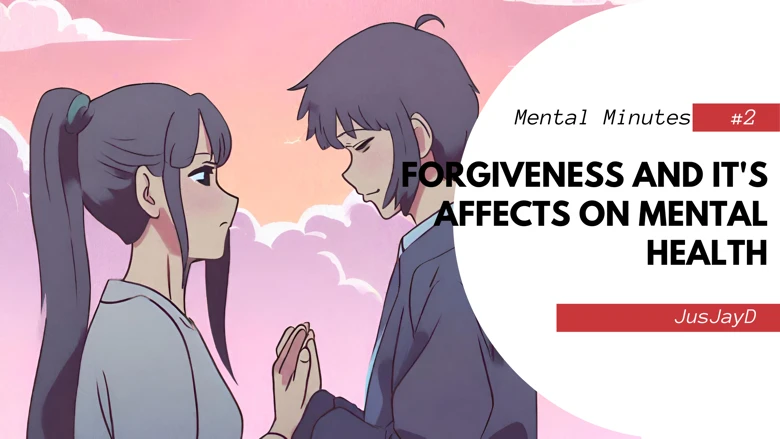Mental Minutes #2 Forgiveness and it's affects on Mental Health
Forgiveness, a deeply human and transformative act, holds the potential to mend wounds, bridge rifts, and release emotional burdens that weigh down the soul. In a world often characterized by conflicts and grievances, the concept of forgiveness stands as a beacon of hope, not only for repairing relationships but also for nurturing one's own mental health. The nature of forgiveness is not an easy path. It requires a conscious decision to let go of negative emotions associated with a transgression or hurtful event. It involves releasing feelings of anger, resentment, and vengeance in favor of empathy, understanding, and ultimately, peace. The act of forgiving does not negate the pain endured; rather, it acknowledges the pain while choosing to move forward without being tethered to it. We all hope for healthy relationships and recovery but it's not always possible.
Forgiveness and Mental Health
Forgiveness has been linked to a myriad of psychological benefits that positively impact mental health. First and foremost, it reduces the emotional burden that harboring grudges places on an individual's psyche. By relinquishing negative emotions, one can experience a sense of emotional relief, leading to reduced stress and anxiety levels.
Moreover, forgiving promotes the cultivation of empathy and compassion. When one forgives, they engage in a process of understanding the motives and circumstances that may have driven the offending party's actions. This shift in perspective can foster a broader sense of empathy not only towards the offender but also towards oneself. As a result, one's overall emotional resilience is bolstered, enabling them to navigate future challenges with a more open heart and mind.
Unburdening the Mind
One of the most remarkable effects of forgiveness on the mind is the liberation it brings. Holding onto grudges and resentment is akin to carrying a heavy load of emotional baggage. This burden can seep into various aspects of an individual's life, affecting their relationships, work, and overall sense of well-being. By choosing to forgive, individuals unburden themselves, creating space for emotional healing, personal growth, and newfound happiness.
Breaking the Cycle
The impact of forgiveness extends beyond individual well-being; it has the potential to break the cycle of negativity and perpetuating harm. In cases of ongoing conflicts or familial disputes, the act of forgiving can be a transformative force that dismantles the destructive patterns of behavior and opens the door to reconciliation. By letting go of past grievances, individuals pave the way for healthier interactions and the possibility of repairing damaged relationships. Remember that forgiveness for the past does not mandate trust in the future. The confrontation itself might structure what has to occur for the other person to get back into the "trusted" category.
Forgiveness, as an act of conscious and deliberate choice, carries immense power to heal and restore mental health. Its effects ripple through an individual's life, promoting emotional well-being, resilience, and empathy. By embracing forgiveness, individuals release themselves from the shackles of bitterness and resentment, creating room for personal growth and genuine happiness. In a world often burdened by strife, forgiveness stands as a beacon of hope, offering the promise of healing and transformation for both the individual and the collective.
Forgiveness doesn't mean reconciliation.
Forgiveness doesn't mean trusting again.
Forgiveness isn't for the other person.
Forgiveness is for your own peace.
Forgiveness is a process.
